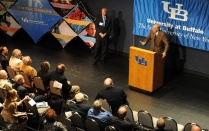Margaret G. McGlynn, MBA '83 & BS '82, of Flourtown, Pa.
By Barbara A. Byers
Release Date: March 18, 2010 This content is archived.
Margaret McGlynn, who recently retired after a 26-year career at Merck & Company, has made a significant impact not only within the University at Buffalo community, but globally as well. Formerly president of the pharmaceutical company's global vaccine and infectious disease (ID) division, she also served as president of the company's U.S. hospital and specialty division.
At Merck, McGlynn was responsible for a portfolio of more than $7 billion in global sales. She led the introduction of several new vaccine products and anti-infective therapies, increasing vaccine sales more than fourfold from 2005-08. Gardasil, the first vaccine to prevent cervical cancer and other sexually transmitted cancers, was launched under her leadership. McGlynn also expanded Merck's vaccine and ID business globally, and launched several initiatives to provide access to its vaccines and HIV therapies in the developing world, including no-profit pricing for Merck's vaccines and HIV therapies in the lowest-income countries, and a donation program in Nicaragua for rotavirus vaccine, which marks the first time a new vaccine was introduced the same year in a developing country as in the U.S.
McGlynn served as a member of the Global Alliance for Vaccines and Immunization Board and Executive Committee, which provides access to essential vaccines in the world's poorest countries, and as a commissioner for the CSIS Commission on Global Health, which advised the Obama Administration on its global health strategy. Her community service includes serving on the Dean's Advisory Council for the UB School of Management and the Industrial Advisory Council for the School of Pharmacy and Pharmaceutical Sciences. She has consistently donated to the university, and she provided a gift that created the Margaret McGlynn Student Research Room at the School of Management and established a fund named for her father, the Edward J. Hempling Community Pharmacy Education Fund, which provides support to student wellness efforts in the community.
In addition to sitting on a number of boards and consulting, McGlynn is currently setting up a research foundation to help develop therapy for a rare genetic disease that led to the death of her two sisters at a young age.

